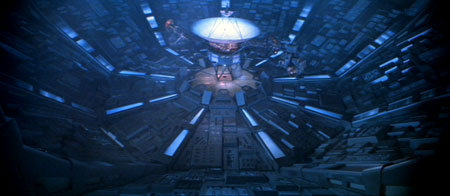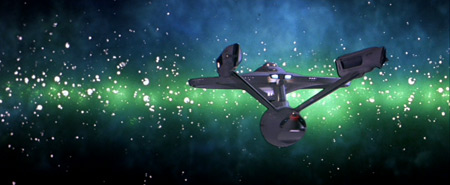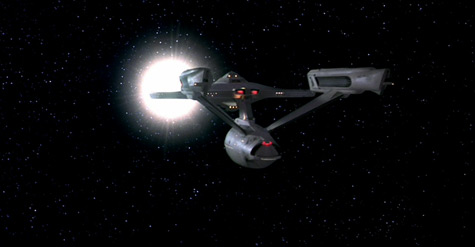Star Trek: Generations (1994)
Director: David Carson
Starring: Patrick Stewart, Jonathan Frakes, Brent Spiner, LeVar Burton, Michael Dorn, Gates McFadden, Marina Sirtis, Malcolm McDowell, James Doohan, Walter Koenig, William Shatner, Alan Ruck, Jacqueline Kim, Jenette Goldstein
![]() (out of 4)
(out of 4)

It seems Shatner is radioactive
WARNING: SPOILERS AHEAD!
Three years after the release of Star Trek VI comes the (first) attempt to restart the franchise using the cast of the The Next Generation TV show (the final season having been recently completed at the time). With Trek 6 giving a flawed but satisfying sendoff for Kirk and crew, we have a new “phase” of Trek, set in the 24th century, featuring the intelligent but usually stoic Captain Jean Luc Picard (played by Shakespearean actor Patrick Stewart), his first officer Will Riker (Jonathan Frakes) – sort-of a Shatner version 2.0, Lt. Commander Data (Brent Spiner) – the android who wants to be human (and Spock 2.0), Klingon Lt. Worf (Michael Dorn, who had played Worf’s grandfather in the previous film) and – to use a Gilligan’s Island reference – “the rest” (Marina Sirtis, Gates McFadden, LeVar Burton). This all comes courtesy of Rick Berman, who took over the reigns of Star Trek after Gene Roddenberry died. Berman worked with writer Brannon Braga, and the pair are simultaneously credited with saving Star Trek (with Star Trek: The Next Generation) and destroying Star Trek (with Enterprise
). I call it the Chris Carter syndrome, which is the tendency for creators to run a successful franchise into the ground because they don’t know when to quit. But I digress. Star Trek: Generations was co-written by Braga and Ron Moore, who also worked on TNG
, DS9
, Voyager
, and the successful updating of Battlestar Galactica
.

Boldly going into yummy cotton candy
The movie starts off with the maiden voyage of the Enterprise B, under the command of Captain Cameron… er, I mean Captain Harriman (Alan Ruck from Ferris Bueller’s Day Off) with Kirk, Scotty, and Chekov also attending the ceremony for the send-off (the rest of the original cast was smart enough to stay away). A distress signal interrupts the ceremony; two ships of El-Aurian refugees are caught in a strange energy ribbon (in temporal flux and stuff!) Scotty manages to beam a few away before the ships are destroyed; the survivors include Soran (Malcolm McDowell) and Guinan (Whoopi Goldberg, reprising her role from TNG). Unfortunately, the ribbon has damaged the Enterprise B, and Kirk has been sucked out into space.
78 years later, we catch up with the Next Generation crew, as Worf is being promoted. Data, still trying to figure out humor, witnesses Worf’s accidental fall into a holodeck ocean. Pushing Dr. Crusher into the water invites shock instead of laughs, prompting him to install Dr. Soong’s emotion chip. This plot point drives Spiner into the role of comic relief. Data laughs, Data Cries, Data exclaims “Oh Shit!” as the Enterprise-D is in trouble. In other words, the main plot of Star Trek 7 isn’t good enough to fulfill the entire running time, hence the “B” story that was prevalent during the first few (crappy) seasons of the TNG television program.

Don't worry, we'll get you back to the View as soon as possible
So what is the primary story? Well, the weird energy ribbon seen earlier is something called the “nexus”, which causes you to enter a fantasy world of your own choosing should you get caught in it. Guinan suggests it’s something like a drug that you’ll never want to give up. Having been pulled away from the Nexus against their will, Guinan has tried very hard to forget it, while Soran, the “heavy” played by a wide-eyed McDowell, is doing everything possible to get back there. This involves using a substance called “Trilithium” which stops all fusion in a star, which will alter the course of the nexus towards the planet Veridian III, where Soran will be waiting to be sucked up into it as it passes by the planet. The problem is, killing a star causes a shock wave which would destroy a nearby planet of millions of people. Thrown into the mix is bad-girls Lursa and B’Tor, Klingon sisters from the TV show who make major trouble for the Enterprise-D crew. (Yes, even the main villain must be accompanied by two B-villians).
Star Trek 7 is Star Trek by executive committee. If you turn on the commentary by Brannon Braga and Ron Moore, you’ll hear them confirming this by speaking about studio requirements, like: figure out a way to bridge the two generations, get an arch-villain in the Khan role, throw in “some Klingons”, and top it off with a “Data comedy-runner”. There’s also the death of Picard’s relatives, the death of Kirk, and the death of the Enterprise-D. Death is everywhere, and Generations wants to talk about it, but the problem is that when these deaths aren’t being poorly conceived, they just seem like plot contrivances. “We’re all gonna die sometime. it’s just a question of how.. and when.” says Soran. Well, the how and the when of Kirk’s death is less than grandiose. If you’re going to kill off a major icon, you could at least give him a worthy exit, something equal to Spock’s sacrifice in Star Trek II, perhaps? No chance of that, unfortunately, as Kirk is defeated by a collapsing bridge in a situation I found implausible and curiously weightless. The same can be said for the destruction of the NCC-1701D. (On the other hand, the death of Picard’s brother and nephew seems cruel but I accepted it as an event integral to his emotional growth). Kirk’s death, in comparison, serves no real purpose other than for shock value, and it has no meaning either, serving a nonsensical, swiss-cheese plot.

Data drinks Everclear
For all the attempts to upgrade the effects, they actually reuse the Bird-of-Prey explosion from Star Trek VI. Otherwise, they are serviceable, and the cinematography is prettier than the previous Trek movies. Too pretty, actually – everything has an antiseptic look and feel, where I never got the impression that anyone was in any real danger. In other words, this is a movie filmed just like the TV show (and a quick glance at director David Carson’s resume shows nothing but television work). Also, in an unwise move, many plot contrivances are ported over from the show as well. For example, there seems to be a major problem with these “Galaxy Class” starships, with all the times that the Enterprise suffers a coolant leak which leads to a warp core breach. I can’t ever remember the first two Enterprise’s ever having any issue with warp core breaches, but the Enterprise of the 24th century gets one if you accidentally sneeze on it.
Generations is way too dull for too many stretches. Scenes of Picard just sitting around the rocks on Veridian III don’t exactly make for riveting viewing. The final battle between Kirk, Picard, and Soran is basically just a fistfight on a bridge. The film pisses all over the original series characters while using them to pass the baton to the Next Gen crew, which collectively do not possess the chemistry or character traits necessary to make them interesting. The good bet would be to have concentrated on the interplay between Picard, Riker, Worf, and Data, but the movie never even tries. A better bet would have been to make the most of the Kirk-Picard teamup, but the writers never do anything with that, either, unless you think that the two captains whipping up a meal in the kitchen is exciting.
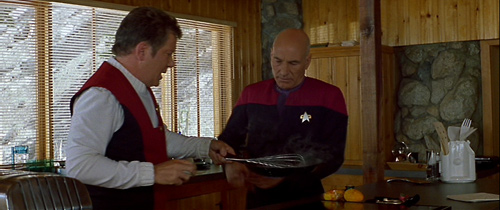
The question of which captain is superior finally solved by who makes the best eggs!

Go cry, emo Picard
They never understood Kirk’s character enough anyway. If Kirk was able to really fulfill his dreams in the Nexus he would have been back on board the Enterprise, sitting in the Captain’s chair, with Spock and McCoy at his side. I even would have accepted a recreation of the campfire sing-a-long from Trek 5, which would have made sense. But Kirk riding around on horses and getting freaky with some woman nobody has ever heard of is not believable. (Antonia? Not Miramani? Edith Keeler? Carol Marcus? And where is David Marcus, anyway?)
You could pass an entire fleet of starships through all the plotholes in this movie. Guinan tells us that the nexus is like being wrapped up in pure joy, that you never want to leave. Well it didn’t take long for Picard to want to leave. Even Kirk is convinced to leave the nexus after only a few minutes of chopping wood, cooking in the kitchen, and riding his horse around. Some “joy”. The movie tells us that ships can’t enter the nexus because they would be destroyed. If that’s the case, how the did Soran and Guinan get into the nexus in the first place? If Picard waltzed out of the nexus back to Veridian III in the past, should there not be two Picards now?

I'm a madman. You can tell that, right?
Star Trek: Generations wants to comment on our mortality, telling us to cherish every moment, and that, as Picard says, “What we leave behind is not as important as how we’ve lived.” Sure, that’s sound philosophy. But it’s already been covered in all of the previous Star Trek movies; it’s nothing new. In the meantime, we get a Trek film that lacks grace, energy, and imagination, using a lame gimmick simply to mark off items on producer Rick Berman’s wishlist. Generations continues the odd number curse started by The Final Frontier. I miss the 23rd century already.
– Bill Gordon

Go die, emo Kirk
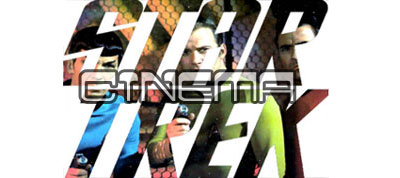
A look at the movies of Star Trek

